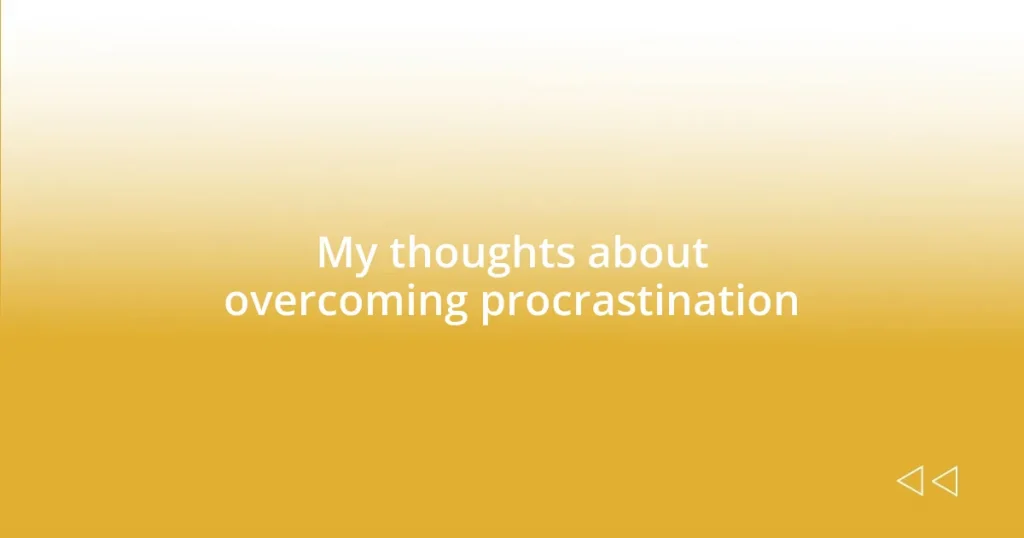Key takeaways:
- Procrastination is often linked to emotional challenges like fear of failure, perfectionism, and distractions from instant gratification.
- Identifying personal triggers, such as task overwhelm and fear of judgment, helps in developing strategies to combat procrastination.
- Effective time management techniques, like the Pomodoro Technique and prioritization, enhance focus and productivity.
- Building accountability partnerships provides motivation and support, encouraging better progress toward goals.

Understanding procrastination challenges
Procrastination often stems from deeper emotional challenges, like fear of failure or perfectionism. I remember a time when I put off starting a personal project because I was so worried about it not being “perfect.” Have you ever felt that overwhelming dread before diving into something new? It’s a trap I fell into often until I realized that waiting for perfection meant I was missing out on the journey itself.
Another common challenge is the way our brains respond to instant gratification. In my experience, it’s easy to get sidetracked by distractions, like scrolling through social media instead of working on something important. I’ve caught myself saying, “Just five more minutes,” which quickly turned into hours. Isn’t it fascinating how something seemingly harmless can pull us away from our goals?
Lastly, I’ve noticed that unclear goals can fuel procrastination, making the path forward feel daunting. When I haven’t set specific targets, I tend to flounder, unsure of where to begin. Can you relate to the frustration of having too many ideas but not knowing which one to pursue? It’s a challenging cycle, but breaking it down into manageable steps made all the difference for me.

Identifying personal triggers for procrastination
Recognizing my personal triggers for procrastination was a game-changer. I began to notice patterns that surfaced in different situations. For example, I often procrastinated when faced with tasks that seemed overwhelming or lacked a clear endpoint. It was during one particularly chaotic week that I realized crowded to-do lists made me freeze up; rather than tackling one item at a time, I was paralyzed by the volume of things I’d set for myself.
Here are some typical triggers I’ve identified:
- Overwhelm from large tasks: I’ve found that breaking them into smaller steps makes a huge difference.
- Fear of judgment: Sometimes, I hesitated to share my work for fear of what others might think, which only led to additional delays.
- Distractions in my environment: My workspace needs to be tidy; a cluttered desk can pull my focus when I least expect it.
- Perfectionism: Just like that personal project I hesitated to start, I often let the desire for perfection dictate my pace.
Being aware of these triggers has empowered me to approach my work differently. Now, when I feel that familiar tug towards procrastination, I can pinpoint what’s happening and take steps to counter it.

Strategies for effective time management
Managing time effectively has been one of my greatest learning curves. One strategy that helped me immensely is the Pomodoro Technique, where I work for 25 minutes and then take a 5-minute break. I remember initially thinking, “How can I focus for just 25 minutes?” But surprisingly, those short bursts kept my energy levels high and my mind sharp, minimizing the urge to procrastinate. Have you ever tried setting a timer and realized how focused you can become?
Another approach I’ve embraced is prioritization, which can feel daunting at first. I often find myself staring at my to-do list, wondering what to tackle first. To make it easier, I categorize tasks into “urgent,” “important,” and “neither.” This method illuminated for me that some tasks are simply not worth my time, freeing me from unnecessary pressure. What’s your experience with prioritizing tasks?
Lastly, I advocate for the idea of setting specific time blocks for different activities throughout my day. At first, the structure felt a bit constricting, like I was putting myself in a cage. Yet over time, I discovered that this framework actually granted me freedom. Knowing exactly when I would write, answer emails, or brainstorm allowed me to dive into tasks without the nagging worry of other things piling up. How do you structure your day?
| Strategy | Description |
|---|---|
| Pomodoro Technique | Work for 25 minutes followed by a 5-minute break to maintain focus. |
| Prioritization | Categorize tasks into urgent, important, and neither to clarify what to tackle first. |
| Time Blocking | Set specific timeframes for each activity, creating a structured yet flexible schedule. |

Techniques to boost motivation
Thinking back, one effective technique I discovered is creating a vision board. I remember spending a weekend crafting one that included my goals and dreams. The simple act of visualizing what I want to achieve ignited a spark of motivation in me. It’s fascinating how seeing those inspiring images and words daily serves as a constant reminder of my aspirations. Have you ever tried such a visual tool?
On a different note, I’ve found that connecting with a like-minded accountability partner boosts my motivation significantly. We check in with each other regularly, celebrating achievements and discussing setbacks. This process has transformed tasks I once dreaded into shared challenges that feel more manageable. It’s reassuring to know someone else is rooting for you, don’t you think?
Another technique that truly resonates with me is the practice of positive self-talk. I recall a particularly tough writing project where self-doubt crept in—my inner critic was relentless. Yet, I retrained my thoughts to focus on what I was capable of achieving. “I am constantly improving,” I would remind myself. This shift not only quieted the negative chatter but propelled me to dive back into my work with renewed determination. What affirmations have worked for you in overcoming insecurities?

Creating a structured daily routine
Creating a structured daily routine has been a game changer for me. I remember the chaos of my unorganized days, where tasks blended together in a blur. Adopting a morning ritual—like enjoying a cup of coffee while reviewing my day—helped me find my center and set a positive tone for what lay ahead. Have you ever experienced how a simple routine can shift your entire mood?
To bring even more order into my life, I dedicated time on Sunday evenings to plan my week. I thoughtfully laid out my tasks and scheduled them into blocks on my calendar, minimizing any surprises. This practice not only made me feel prepared, but also ensured that I kept a pulse on my progress throughout the week. How does planning in advance influence your sense of control over your time?
What I’ve found particularly enlightening is adjusting my routine based on my energy levels. I learned the hard way that I shouldn’t schedule demanding tasks during my afternoon slump. For example, I used to tackle writing during that time and would often end up staring at a blank screen. By shifting creative work to my peak hours, I bask in the flow of creativity, feeling accomplished instead of defeated. Have you found your own rhythm that helps you seize the day?

Developing accountability partnerships
Finding an accountability partner has drastically changed how I approach tasks. I remember when I teamed up with a friend who was also working on self-improvement goals. We committed to sharing our progress every week, and suddenly, I felt a newfound sense of purpose. Have you ever experienced that feeling of accountability pushing you to achieve more than you thought possible?
The beauty of this partnership lies in the shared journey. Whether we’re discussing our victories or supporting one another through setbacks, it fosters a sense of camaraderie that makes the tedious aspects of productivity feel lighter. I recall a moment when I was struggling with motivation and shared my frustrations; my partner reminded me of my previous successes and helped me reframe my mindset. How often do we overlook the power of a supportive voice cheering us on?
Moreover, accountability partnerships can take many shapes. Sometimes, it’s as simple as texting a friend about your goals and having them check in with you later. I recall a time I texted my partner about wanting to finish a project by a specific date, and that gentle nudge kept me on track. This connection not only holds you accountable but also creates a network of encouragement—an essential lifeline when procrastination tries to creep in. What small step could you take today to build your own accountability network?















